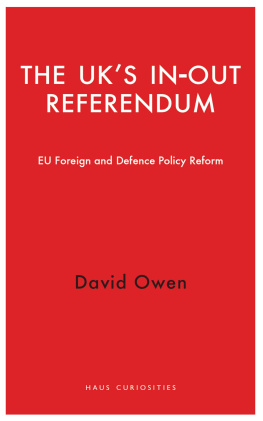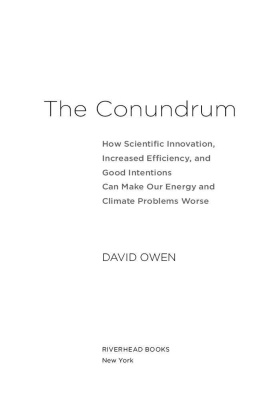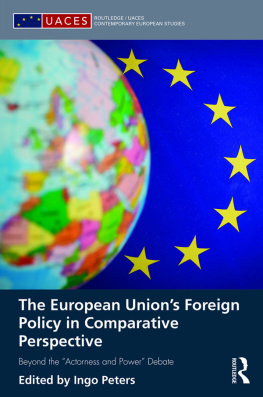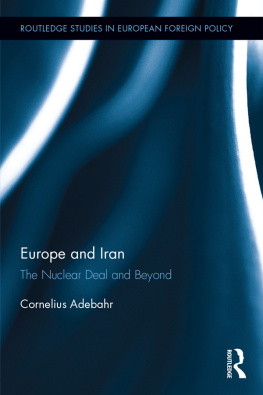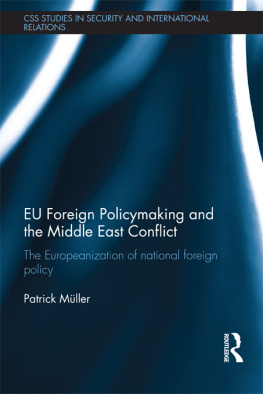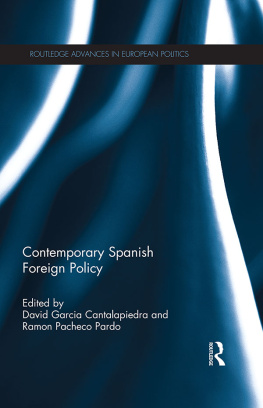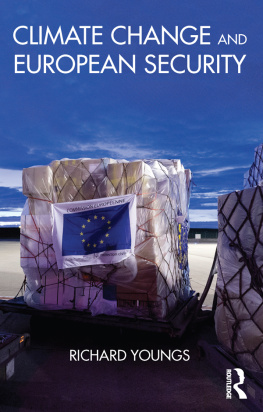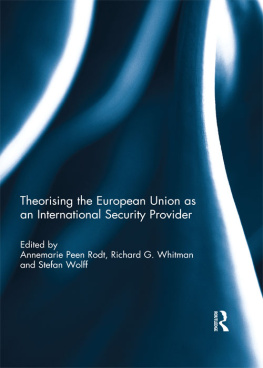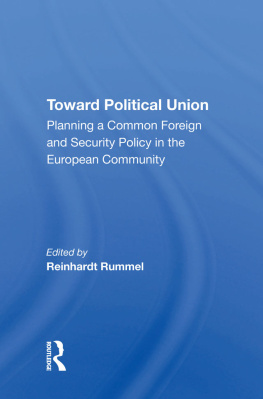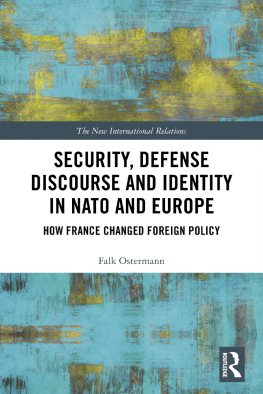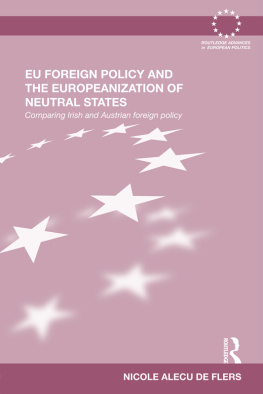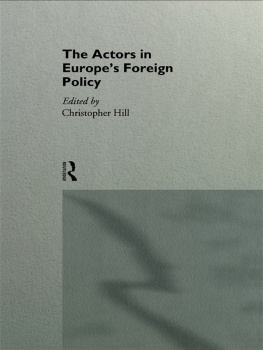HAUS CURIOSITIES
The UKs In-Out Referendum
ABOUT THE AUTHOR
David Owen (Lord Owen) trained as a medical doctor and practised as a neurologist before being elected a Labour MP in his home city of Plymouth. He served as Foreign Secretary under James Callaghan from 1977 until 1979, and later co-founded and went on to lead the Social Democratic Party (SDP). Between 199295 Lord Owen served as EU peace negotiator in the former Yugoslavia, and he now sits as an Independent Social Democrat in the House of Lords. He is the author of many books, including In Sickness and In Power, The Hubris Syndrome and The Hidden Perspective.
Stephen Green
THE UKS IN-OUT REFERENDUM
EU Foreign and Defence Policy Reform
First published by Haus Publishing in 2015
70 Cadogan Place
London SW1X 9AH
www.hauspublishing.com
Copyright David Owen, 2015
The right of the author to be identified as the author of this work
has been asserted in accordance with the
Copyright, Designs and Patents Act 1988
A CIP catalogue record for this book is available from the British Library
Print ISBN: 978-1-910376-17-1
Ebook ISBN: 978-1-910376-29-4
All rights reserved.
The UKs In-Out Referendum
There is a grave danger that the European Union will go on pretending, despite the UK negotiation, that it can avoid or delay making the structural changes that it urgently needs to convince the people in its Member States that it can overcome the formidable problems it now faces. Six years on, the Eurozone is still in the midst of an economic crisis. Greeces problems are not resolved. The French and Italian economies are still not confronting their need for radical change and there are serious weaknesses in other Eurozone economies. Geopolitically, the EUs pursuit of conflict resolution leaves much to be desired. The EU policy over its Association Agreement with the Ukraine triggered the conflict in that country and there are now serious related military tensions developing on the Russian Federations borders with the three Baltic states, Estonia, Latvia and Lithuania, to which NATO is responding. There is trouble brewing in Bosnia-Herzegovina where the behaviour of the Bosnian Serbs shows few signs of being checked by Serbia. Public tolerance is stretched by uncontrolled economic migration into the EU from Syria and other countries, like Eritrea and even Afghanistan. The so-called Islamic State is now occupying Iraq and Syria, has attacked Beirut in Lebanon and a Russian plane over Egypt, and operates from Darnah in Libya. The EU has yet to agree a coherent policy towards Turkey. Its policy of common defence within the European Common Security and Defence Policy, CSDP, risks deeply damaging competition with NATO planning and its cohesion.
This booklet is about how the foreign and defence policies of the EU and the geopolitical problems of the wider Europe are inextricably linked to the negotiations prior to the UK voting on whether to remain in or leave the EU. That vote will have to take place by the end of 2017, though it looks as if the government will try and rush it through in the summer of 2016. If the EU dismisses this period of negotiation as one of little significance to them and as a matter just for the British, it will sleepwalk into a catastrophe. The outcome will have profound economic and geopolitical consequences, not just for those parts covered by the EU and NATO, but for the whole of wider Europe (see diagram below).

When an ever more integrated Eurozone emerges and starts to vote en bloc within the EU, it will be vital for a Non-Eurozone qualified majority to have been established and to be able to prevent Eurozone domination in not just the Single Market but in all aspects of the EU, particularly foreign and security policy. The extent to which the Eurozone moves to give more authority to voting in the Eurozone bodies and the European Parliament depends on how ready Eurozone Member States are to mirror the democratic procedures of a single country, give up unanimity, rely more on a simple majority or increase the number of Member States needed to form a blocking minority all steps towards a United States of Europe. If the Eurozone deals with its democratic deficit through democratic enhancement, then it is essential to establish the right for a Non-Eurozone Member State to block or opt-out of changes to the architecture of not just the Single Market but also EU foreign and defence policies and, if need be, revert to the consensus of European Community Political Cooperation for foreign and security policies.
Amending the treaties language is being refused in advance of France and Germany holding their elections in 2017. But since the Maastricht Treaty was written assuming that all EU countries would inexorably join the Eurozone, which they are clearly not doing, why cant this change be made by unanimity in the European Council? That mechanism was part of the Lisbon Treaty. The cardinal sin of the EU was in abandoning the supranational and the intergovernmental pillared structure that was part of the Maastricht Treaty compromise. Eurozone integration will not establish a consensus decision-making body but one where the majority gets its way; inevitably this will overflow into foreign and defence decision-making unless new powers to check this are built into the treaties.
Ever greater political integration is the fundamental issue behind and within the UK demand for a major renegotiation and a referendum. It is why the government has singled out the wording ever closer union. Though it applies to the peoples and not to the nations in the treaties, a formulation accepted even by Margaret Thatcher, it has come through persistent application of what is called the Community Method to mean nations. It was these words ever closer union that David Cameron strongly objected to and was the reason for his party withdrawing from the Christian Democratic grouping in the European Parliament, deeply resented by Angela Merkel. To change that interpretation requires more than a statement it needs treaty change too. Not surprisingly, those who have already started today to campaign for the UK to remain in the EU are often people who have supported Eurozone membership for the UK on every past occasion it has been open to debate. Many of them still passionately wish to maintain the option of Eurozone membership for the future. Many also resisted the European Act 2011 that triggers a referendum in the UK before any further loss of British sovereignty can be conceded by ministers. This Act was William Hagues achievement when Foreign Secretary, along with EU recognition that foreign policy decisions have to also be described as Member States decisions to be legally approved. But the Act alone is not enough. We cannot have referenda on every issue and yet ever greater unity is built up on the basis of many small decisions not least by the European Court of Justice (ECJ).

